South Korean lawmakers yesterday impeached South Korean President Yoon Suk-yeol over his failed martial law bid, with the opposition declaring a “victory of the people.”
The vote capped more than a week of intense political drama in the democratic South following Yoon’s failed attempt to impose martial law on Dec. 3.
Hundreds of thousands of people took to the streets of the capital, Seoul, in rival rallies for and against Yoon yesterday.
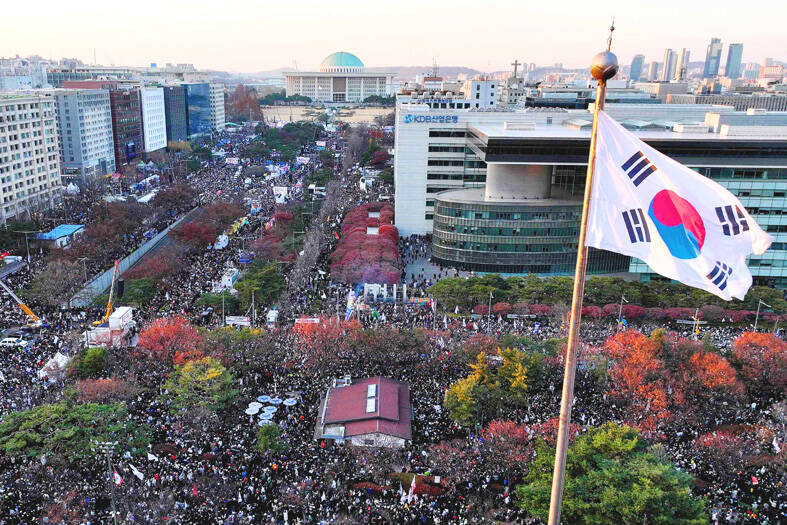
Photo: AFP
In a televised address following the National Assembly vote, the impeached Yoon said he would “step aside,” but did not apologize for his botched bid to impose martial law.
Out of 300 lawmakers, 204 voted to impeach the president on allegations of insurrection while 85 voted against. Three abstained, with eight votes nullified.
With the impeachment, Yoon has been suspended from office while the South Korean Constitutional Court deliberates on the vote.
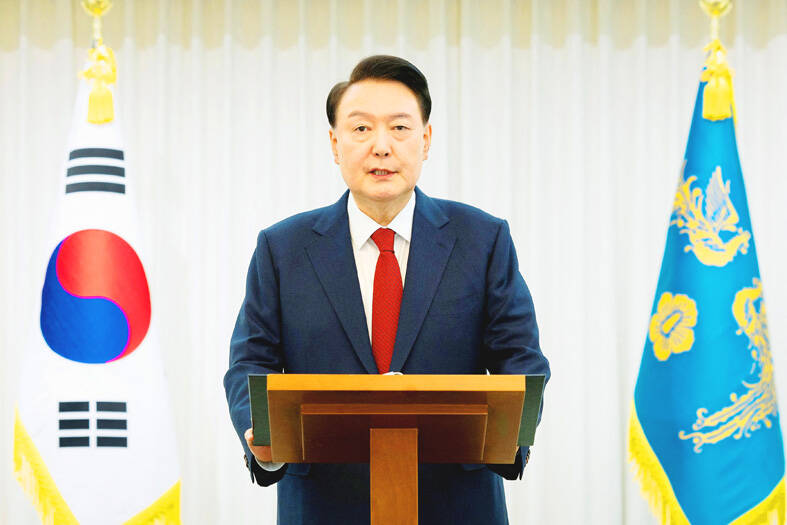
Photo: Reuters
The court has 180 days to rule on Yoon’s future.
South Korean Chief Justice Moon Hyung-bae vowed to hold “a swift and fair trial.”
If the court backs his removal, Yoon would become the second president in South Korean history to be successfully impeached.
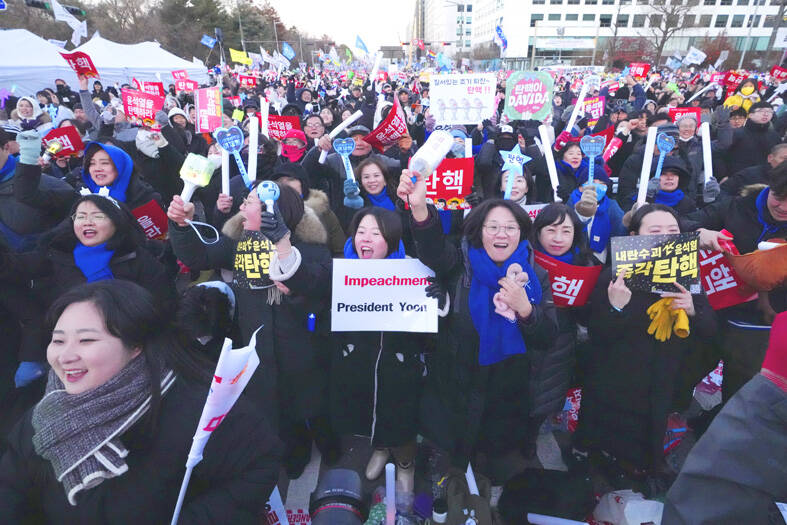
Photo: AP
South Korean Prime Minister Han Duck-soo — now the nation’s interim leader — told reporters he would “devote all my strength and efforts to ensure stable governance.”
Two hundred votes were needed for the impeachment to pass, and opposition lawmakers needed to convince at least eight lawmakers from Yoon’s conservative People Power Party (PPP) to switch sides.
“Today’s impeachment is the great victory of the people,” opposition Democratic Party floor leader Park Chan-dae said following the vote.
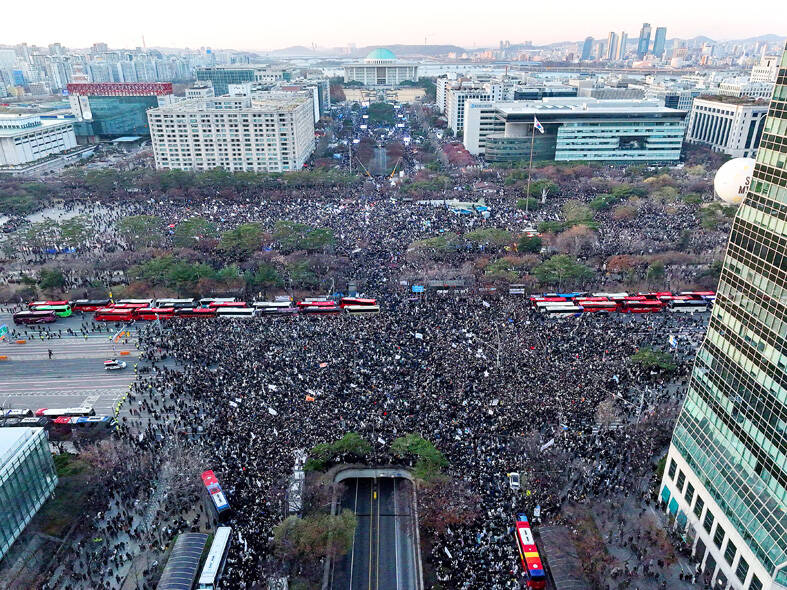
Photo: Reuters
PPP lawmaker Kim Sang-wook told broadcaster JTBC that Yoon had “completely betrayed the values of conservatism.”
“That is why we, as ruling party lawmakers, have decided to remove him ourselves,” he said.
A Seoul police official said at least 200,000 people had massed outside the National Assembly in support of removing the president.
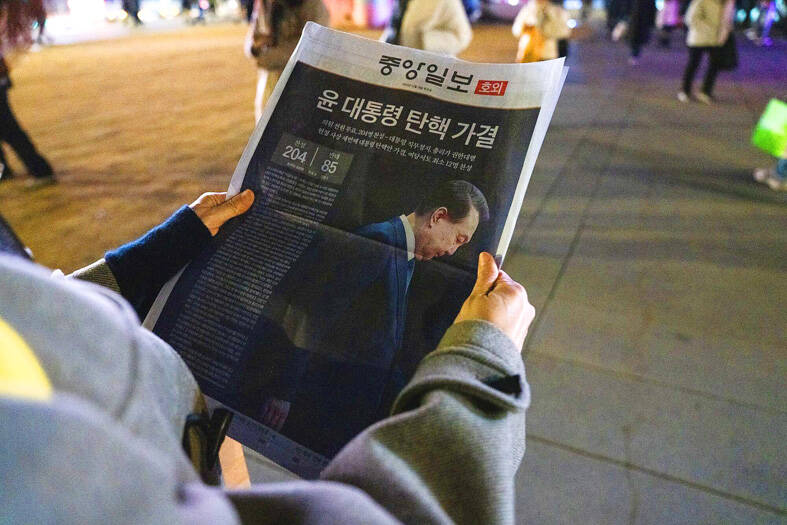
Photo: Bloomberg
On the other side of Seoul near Gwanghwamun Square, police estimated 30,000 had rallied in support of Yoon, blasting patriotic songs and waving South Korean and US flags.
“Yoon had no choice but to declare martial law. I approve of every decision he has made as president,” supporter Choi Hee-sun, 62, said before the vote.
The Democratic Party ahead of the vote said that impeachment was the “only way” to “safeguard the constitution, rule of law, democracy and South Korea’s future.”
“We can no longer endure Yoon’s madness,” spokeswoman Hwang Jung-a said.
At the rally outside the National Assembly supporting impeachment, volunteers gave out free hand warmers to fight the subzero temperatures, as well as coffee and food.
K-pop singer Yuri of the band Girls’ Generation — whose song Into the New World has become a protest anthem — said she had prepaid for food for fans attending the demonstration.
“Stay safe and take care of your health!” she said on a superfan chat platform.
Yoon’s future will now be determined by the court, which has previously blocked an impeachment. In 2004, then-South Korean president Roh Moo-hyun was removed by the National Assembly for alleged election law violations and incompetence, but the Constitutional Court later reinstated him.
The court currently only has six judges, meaning their decision must be unanimous.
Following yesterday’s vote, South Korean National Assembly Speaker Woo Won-shik said the National Assembly would seek to nominate three more judges to the court as soon as possible.
Yoon’s approval rating — never very high — plummeted to 11 percent, according to a Gallup Korea poll released on Friday.
The same poll showed that 75 percent supported his impeachment.

A Ministry of Foreign Affairs official yesterday said that a delegation that visited China for an APEC meeting did not receive any kind of treatment that downgraded Taiwan’s sovereignty. Department of International Organizations Director-General Jonathan Sun (孫儉元) said that he and a group of ministry officials visited Shenzhen, China, to attend the APEC Informal Senior Officials’ Meeting last month. The trip went “smoothly and safely” for all Taiwanese delegates, as the Chinese side arranged the trip in accordance with long-standing practices, Sun said at the ministry’s weekly briefing. The Taiwanese group did not encounter any political suppression, he said. Sun made the remarks when

The Taiwanese passport ranked 33rd in a global listing of passports by convenience this month, rising three places from last month’s ranking, but matching its position in January last year. The Henley Passport Index, an international ranking of passports by the number of designations its holder can travel to without a visa, showed that the Taiwan passport enables holders to travel to 139 countries and territories without a visa. Singapore’s passport was ranked the most powerful with visa-free access to 192 destinations out of 227, according to the index published on Tuesday by UK-based migration investment consultancy firm Henley and Partners. Japan’s and

BROAD AGREEMENT: The two are nearing a trade deal to reduce Taiwan’s tariff to 15% and a commitment for TSMC to build five more fabs, a ‘New York Times’ report said Taiwan and the US have reached a broad consensus on a trade deal, the Executive Yuan’s Office of Trade Negotiations said yesterday, after a report said that Washington is set to reduce Taiwan’s tariff rate to 15 percent. The New York Times on Monday reported that the two nations are nearing a trade deal to reduce Taiwan’s tariff rate to 15 percent and commit Taiwan Semiconductor Manufacturing Co (TSMC, 台積電) to building at least five more facilities in the US. “The agreement, which has been under negotiation for months, is being legally scrubbed and could be announced this month,” the paper said,

MIXED SOURCING: While Taiwan is expanding domestic production, it also sources munitions overseas, as some, like M855 rounds, are cheaper than locally made ones Taiwan and the US plan to jointly produce 155mm artillery shells, as the munition is in high demand due to the Ukraine-Russia war and should be useful in Taiwan’s self-defense, Armaments Bureau Director-General Lieutenant General Lin Wen-hsiang (林文祥) told lawmakers in Taipei yesterday. Lin was responding to questions about Taiwan’s partnership with allies in producing munitions at a meeting of the legislature’s Foreign Affairs and National Defense Committee. Given the intense demand for 155mm artillery shells in Ukraine’s defense against the Russian invasion, and in light of Taiwan’s own defensive needs, Taipei and Washington plan to jointly produce 155mm shells, said Lin,